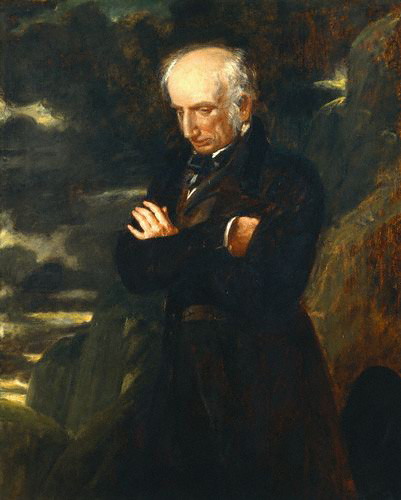Welcome back to our continuing series on the poets of the Regency! This is where we find out what might have been in the slim volumes of verse a Regency heroine would reach for in her well-appointed library when she wanted a little literary distraction. Today’s Regency-era poet? The master of the English Romantic movement: William Wordsworth.
The glory of the hills
The Lake District was Wordsworth’s stomping ground and inspired much of his poetry. Part of the reason the area became a popular tourist destination during the Regency (if you’ll remember, Elizabeth Bennett made plans to visit the area with her aunt and uncle in “Pride and Prejudice”), was because of Wordsworth’s poetry (he also published a guide to the area in 1810).
In an era before National Geographic television specials, Wordsworth’s command of words took the natural glory of the Lake District and brought it to life in the minds of city-dwellers, firing their desire to visit the land full of fells and falls.
 The religion of nature
The religion of nature
But if his poetry had merely been a recitation of the beauties of nature, it would never have struck the deep chord that it did. Instead, Wordsworth took the sweetness of what he saw and heard in the hills and distilled it down into an essence of peace that comforted him when he was again “in lonely rooms, and mid the din/Of towns and cities“.
Indeed, he was almost a panentheist, sensing in the world around him
A presence that disturbs me with the joy
Of elevated thoughts; a sense sublime
Of something far more deeply interfused,
Whose dwelling is the light of setting suns,
And the round ocean, and the living air,
And the blue sky, and in the mind of man,
A motion and a spirit, that impels
All thinking things, all objects of all thought,
And rolls through all things.
This sub-Christian philosophy had the effect both of deepening the meaning of his work and of making his sentiments provocative and controversial. Personally, I always want to read him twice: once to drink in all the beauty of his verse, and once to argue my way through the philosophy of it.
But what I have learned from Wordsworth – what I will be forever grateful to have learned – is how to drink in God’s creation when I am in the midst of it. How to notice, really notice, the glory of my surroundings when I’m somewhere beautiful like the high Sierras or the Oregon coast, and then how to take those memories out and relive them when I’m again trapped in the concrete jungle of the city, or when my heart is discouraged or my feelings low. Wordsworth didn’t just “wander lonely as a cloud”, he taught us all how to keep our eyes and our hearts open during our wanderings, and to return home richer than we left, memories full and minds engaged in thoughts about everything we saw when we were out in the world.
Make like a lady of the Regency and read some Wordsworth
Two poems to start with? One, the famous “I Wandered Lonely as a Cloud”. It’s short, but much richer than you might expect from a poem ostensibly about little yellow flowers. Then, if that whets your appetite, go on to the slightly longer, immensely powerful “Tintern Abbey”. Remember, it’s always going to be better read aloud, so you can hear the rhythm and flow of the language.
If you do go and read some Wordsworth, come back and tell me what you thought of him in the comments! Or if you’ve a favorite Wordsworth poem already, let me know what it is!
Also, let me know if you have a beautiful place you bring to your mind when you need a little bit of beauty to life your heart. My favorite is King’s Canyon in the Sequoia National Forest, and I’d love to hear what yours is!
Peace of Christ to you,
Originally posted 2012-05-28 10:00:00.


Comments are closed.